

YAMAGATA DOCUMENTARY DOJO2
The Yamagata Documentary Dojo is a 4-week filmmaker-in-residence program hosted in the city of Yamagata, in northern Japan. Asian filmmakers working on documentary projects are invited to reside in a lakeside inn in the mountainous hot spring spa of Zao. The idea is to use the retreat as an opportunity to review their work from new perspectives. The program kicks off with a 4-day workshop which brings the participants together with Japanese filmmakers and international professional mentors. The group stays together in a Japanese-style inn, isolated from the bustle of the city. During the rest of the residency, the filmmakers focus on reworking their projects, while taking part in cultural activities with Yamagata children and people. At the end of their stay, they take part in wrap-up presentations in Yamagata and Tokyo.
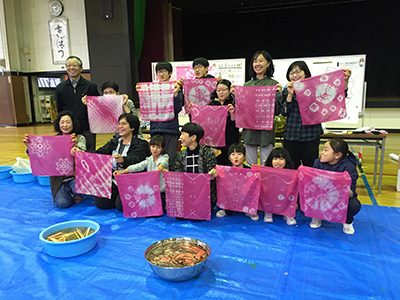
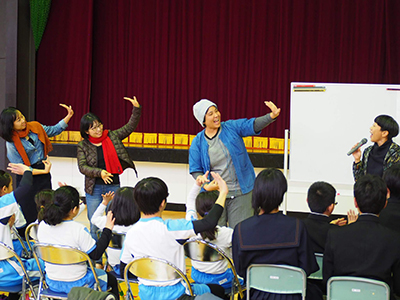
Artists-in-Residence (AIR) residents (Nov. 6 – Dec. 5)
1. Project “LOMA – Our Home” (Taiwan)
with director Huang Hui-chen, editor Lei Chen-ching, producer Stefano Centini
2. Project “Audacious Dreams of Kith and Kin” (Thailand)
with director Waraluck Hiransrettawat Every (Salee), editor Duangporn Pakavirojkul (Bee)
3. Project “Sorry No. 55” (Singapore, exchange program with Objectifs)
with director Kris Ong
Workshop participants from Japan (Nov. 8 – 11)
Ikezoe Shun, Oikawa Natsumi, Nomura Tomokazu, Yamada Toru, Yang Kwihae
Mentors
Avi Mograbi (filmmaker / Israel), Tan Pin Pin (filmmaker / Singapore), Morinaga Yasuhiro (sound designer, sound artist / Japan), Yamazaki Yutaka (DOP / Japan)
Advisors
Erkko Lyytinen (YLE / Finland), Ellie Jo (DMZ Docs / Korea), Chalida Uabumrungjit (Thai Film Archive / Thailand), Julie Rymer (producer / Australia), and others
Major events open to the public ★ Nov 13 (Wed) Yamagata University
08:50-10:20 Masterclass with Avi Mograbi and Tan Pin Pin
16:50 – 18:30 Screening of Once I Entered a Garden (dir Avi Mograbi, 2012, 97 min)
& talk with director
★ Nov 22 (Fri) YIDFF Friday Screenings @Yamagata Documentary Library
15:00 You Idiot (dir Kris Ong, 11 min) & talk with director
16:00 Y/Our Music (dir Waraluck Hiransrettawat Every & David Reeve, 2014, 82 min)
& talk with Waraluck Hiransrettawat
18:40 Small Talk (Huang Hui-chen, 2016, 88 min) & talk with director
★ Dec 1 (Sun) 15:00 – 17:00 Wrap-up presentation in Yamagata (Sangoro Onsen Lodge)
★ Dec 4 (Wed) 19:00 – 21:00 Wrap-up presentation in Tokyo (Cinema House Otsuka)
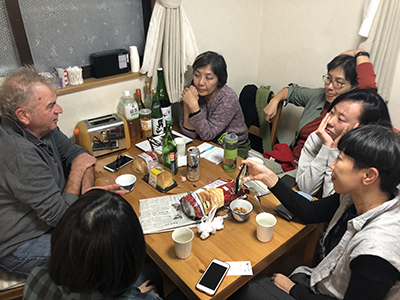
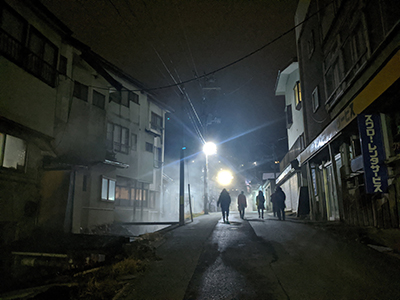
Voices of participants of DOJO 2019
Yamagata Documentary Dojo 2019 was the most memorable 30 days in my life.
(Waraluck Hiransrettawat, filmmaker/Thailand)
I love the environment and the nature and so I go jogging in the morning to give me power to edit. In the lake there is more oxygen and the mountains give me inspiration, power.
(Duangporn Pakavirojkul, editor/Thailand)
We talked about the deepest issues of filmmaking, really, the core of what it means to make documentary, what it means to meet with real people with real lives with real issues, and not made-up dramatized films. And the fact that there was a variety of mentors of different professions (like cinematographers and sound designers) was fascinating, because this raised not only craft questions but serious principle questions. I thought it was extremely interesting. (Avi Mograbi, mentor/Israel)
In a lot of labs, you have meetings from morning to night with different people, they talk at you about what they think of your project and how you can improve, blah blah blah blah. In the Documentary Dojo, there’s a 360 degree view of everyone sparring with each other, practicing in the same space. There is also a sense of everyone supporting each other as we progress at our own pace. We see each other and learn from each other. The martial arts dojo metaphor is more appropriate to developing projects than the lab model. The idea is to embolden the spirit of each and everyone of us with the help of a community.
(Tan Pin Pin, mentor/Singapore)
It’s a very comfortable environment. The landscape is so beautiful, the onsen, the food, the people. It makes you physically in a very good condition, and mentally gives you the space to work on the craft of your work. I can see the very supportive and carefully curated selection by the organizer to create this environment for filmmakers who want to elevate their work.
(Catherine Chang, producer/Hong Kong)
It’s a pleasure and an adventure, actually, to be immersed and submerged in these projects at very different stages, and very different aspects of their lives. A lot of it has to do with sharing the human experience, so it goes beyond being just a documentary workshop. We are actually sharing in human emotions, human vulnerability and compassion, and we are helping not only to give advice or feedback, but we may be sharing with the person’s own life journey. That’s for me, more important than technique. It’s a precious experience that’s only possible in this kind of bubble here. It’s a very intimate bubble. It’s not just the mentors giving but everyone is giving and taking at the same time. (Mary Stephen, advisor / France)
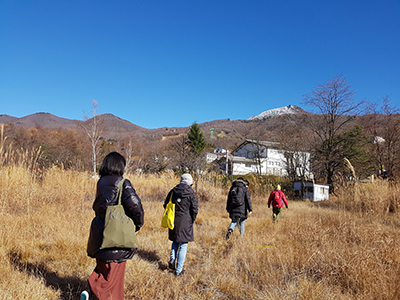
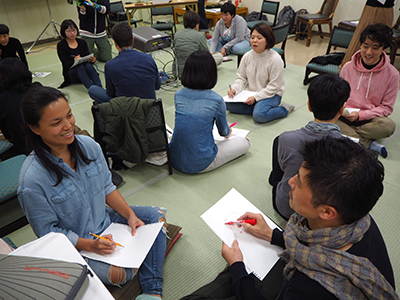
At home in Taiwan life goes on year after year, day after day, and we are super busy. It’s easy to forget what’s important. We work Monday to Friday and then when we have some rest we have to deal with everyday life stuff. It’s very hard for us to let go of these everyday problems but when we come here, we realize they are not so important. We are given the time to dedicate ourselves completely to one film. Here, the temperature, the environment, the nature is so different from home. So it creates something very special.
(Lei Chen-ching, editor / Taiwan)
It’s always good to meet and discuss with people who have a different culture from you. The world is this big and you can only see one spot. If you can talk more with others, you will know more about the world. Dojo also gave me a good opportunity to get along with myself and collect my thoughts in the beautiful nature — that was the very thing I’d been dreaming of.
(Huang Hui-chen, filmmaker / Taiwan)
It was really great hearing from other filmmakers at the workshop, especially those who are more experienced than I am. At the end of it, I came out stronger. I could see my project and ideas more clearly, with perspective and thoughtfulness.
(Kris Ong, filmmaker / Singapore)
I attended because I hoped I could get connected with Japanese filmmakers. I really appreciate the opportunity to better understand the ideas and process of what they’re working on and I really enjoyed it.
(Ellie Jo, DMZ Documentary Film Festival / Korea)
Instead of learning (the tricks of filmmaking) from someone, the issue was to search together for the essence of things. Thanks to the variety of nationalities, cultures, and film styles represented among the participants, I was able to think about what filmmaking is for me, and why I want to make films, what is my style, and what is the essence in my theme. I will continue to make films, in dialogue with the questions that the dojo gave me.
(Ikezoe Shun, filmmaker / Japan)
More than anything, finding a welcoming audience for the footage that I had kept in hibernation for some years and its protagonists turned out to be a strong push on my back to move ahead towards the long process towards completion and release.
(Nomura Tomokazu, filmmaker / Japan)
Four days, surrounded by the nature of Zao, talking about documentary from morning to late night with people who are serious about filmmaking. . . There was an atmosphere not only during the workshops but over dinner and in the hot bath after that allowed me to speak frankly with the top filmmakers of the world. Immediately after arrival I realized that I had reached a state of mind acutely focusing on the documentary.
(Yang Kwihae, filmmaker / Japan)
The best thing about participating in the dojo were the many connections I made with other filmmakers. I feel this was made possible thanks to the culture that the film festival (YIDFF) has cultivated over 30 years. There is a family-like love that is supportive of filmmakers and films. The bonds that I made here are a life-long treasure for me and I pledge to foster them throughout my career. For young independent filmmakers like the former me, who are stuck in a project, depressed and lonely, I hope to support them by providing for them with what I learned at the Yamagata Documentary Dojo.
(Yamada Toru, filmmaker / Japan)


Yamagata Documentary Dojo 2019 is:
Organized by: Documentary Dream Center
www.ddcenter.org Email info@ddcenter.org
Supported by: The Agency for Cultural Affairs, Government of Japan in the fiscal 2019
And: The Japan Foundation Asia Center, Grant Program for Promotion of Cultural Collaboration; Tokyo Docs
With the assistance of: Yamagata International Documentary Film Festival (NPO), Yamagata City Residency Partner: Objectifs








Introducing *Yamagata Documentary Dojo 2019* (22 min video)


